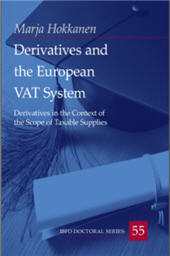2020 - IBFD Publishing
E-book
Digital Version
Download | Copy/Paste (unlimited)
Derivatives and the European VAT system : derivatives in the context of the scope of taxable supplies
 E-PUB
Disponibile anche in PDF
E-PUB
Disponibile anche in PDF xix, 397 p.
- Includes bibliographical references (p. 347-397).
- If derivatives are capable of destabilizing the world economy, they are too powerful a tool to be ignored in European VAT. That said, while certain types of derivatives (e.g. gold derivatives and certain options) are currently regulated under the EU VAT Directive (2006/112/EC), the lack of regulation in respect of derivatives in general has led to individual EU Member States treating derivatives very differently. The distinct lack of regulation on an EU level brings uncertainty as to how these instruments should be treated, and the resulting inconsistencies and lack of guidance at a national level have effectively jeopardized any prospect of achieving neutrality and equality in treatment across the EU derivatives market.
- In 2007, the European Commission published its proposal for a Council Directive amending Directive 2006/112/EC, which included the regulation of derivatives. However, a final compromise was never reached, and the proposals were finally withdrawn by the Commission in April 2016. The challenge of defining derivatives in the scope of the European VAT system is not easy because of the diversity of derivatives. At the same time, the European VAT system presents challenges in analysing derivatives in the context of legal tender, consideration or reciprocal supplies, just to name a few, which have a special role in the world of derivatives.
- The aim of the research is to define the most common types of derivatives (i.e. commodity and financial options, futures, forwards and swaps) in terms of the European VAT system and to bring clarity to the EU area regarding their VAT treatment on the basis of the VAT Directive, thereby attempting to give concrete answers as to how derivatives should be treated, with specific reference to the scope of the VAT system as defined under articles 1 and 2(1) of the VAT Directive. Another question to be answered is whether derivatives as financial instruments or contracts represent transactions in goods or services in VAT terms or whether the underlying transactions in goods and services should provide the sole focus for VAT. Also, the nature of derivatives as financial instruments raises question as to whether derivatives should also be entitled to the exemption afforded to financial and insurance services under article 135(1) of the VAT Directive.
- In addition to the supply of commodities, interesting questions regarding whether derivatives trading can be considered an economic activity as defined under article 9(1) of the VAT Directive are examined. Other pertinent questions raised concern what, if anything, constitutes consideration under a derivative, as well as when VAT becomes due, i.e. when the chargeable event takes place. In addressing the research question, the doctrinal method is appropriate in bringing clarity to the definition of the scope of VAT as a key first step. The interpretation of articles 2(1)(a)and (c), 9(1) and 135(1) of the VAT Directive is crucial in this regard and effectively forms the basis for the research. [Publisher's text]
- Thesis.
- 1018273 characters
-
Information
ISBN: 9789087226367
SERIES
DISCIPLINES


